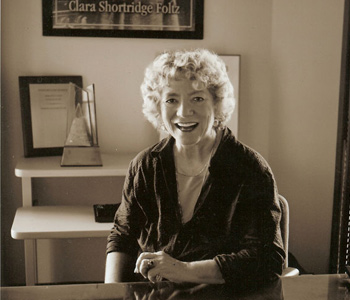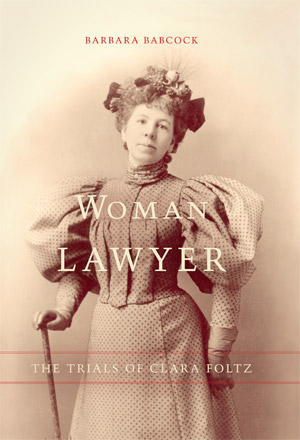
Foltz’s life was eventful and interesting—arguing to all-male juries, stumping in political campaigns, working for woman suffrage and criminal justice reforms. She attained a kind of celebrity that few people of either sex enjoyed, partly because of the human interest of her situation. Foltz was a single mother of five young children when she burst upon the political and legal scene in California by waging a great battle to learn the law and join the Bar.
Her story casts new light on the post-civil war period in the United States. Foltz was there in 1879 when California averted class and race war by framing a new constitution; she participated in the Southern California land boom in the eighties, and oil boom at the turn of the century. In her radical political phase, she joined a socialist-utopian movement, and ran for city attorney of San Francisco on the ticket of the People’s Party. Many other forgotten characters, male allies and movement women, are revealed in the search for Clara Foltz.
The book is also about Foltz’s thought. Today we would call Foltz a “public intellectual.” She commented on the criminal justice system, and campaigned for a public defender. She spoke on the subject on a platform with the nation’s most distinguished law professors and judges at the Chicago World’s Fair. Her vision of that office and its necessity is still important. She anticipated the Progressive era jurisprudence also in her campaign for parole, and her proposal for speeding up the rate of legal change to match the pace of technological innovation.
“Foltz formulated constitutional and practical arguments to support her radical idea that the government should be equally interested in the fair presentation of both sides of a criminal case.”
Clara Foltz was a leader of two great movements: for women’s rights and for public defense. The book conceptualizes these two as connected in her person as well as in a larger sense.
Whatever else she was doing, Foltz was also working for the freedom of women to be educated, to follow a profession, to vote, to serve on juries, and to seek election to public office. She called herself a “woman’s rights woman” and though she did not use the term feminism, concern for women was at the center of all her activities.
The long struggle for women’s rights—with its internal divisions and seemingly endless marches, petitions, lobbying, rallying—can be tiresome and repetitive as a stand-alone story. But through Clara Foltz’s energetic and visionary activities, the tale gains interest. And it ends in victory when women won suffrage in California in 1911.
Foltz’s other major cause was public defense. She came to the idea from representing poor people charged with crime.
Initially, poor people were the only ones to brave the choice of a woman lawyer. Going to court for these clients, Foltz was amazed to see the conditions created when there was a paid prosecutor but no regular defense bar. She formulated constitutional and practical arguments to support her radical idea that the government should be equally interested in the fair presentation of both sides of a criminal case. She waged an active campaign in Los Angeles to enact it—and with the support of the newly enfranchised women, the first public defender was established there in 1913.
Like Clara Foltz, my own two causes have been women’s rights and public defense. These connections sustained me in re-creating her life as they enabled her in living it.
I joined the second wave of the women’s movement in the late sixties. At the time I was the public defender in Washington D.C.—the first woman to hold that office. The new women’s movement brought an overnight increase in the numbers of female law students, and the elite law schools moved to add women to their faculties. I came to Stanford in 1972, as the first woman on the regular faculty of the law school, and began teaching sex discrimination courses in addition to more conventional subjects such as civil and criminal procedure. And for the last decade or so I have taught a seminar in women’s legal history.
I hope the reader would happen on one of the eighteen or so accounts of cases Foltz had and causes she tried. They show her at her brave and skillful best in the rough and tumble of the western courts, where she won a reputation as jury lawyer and passionate advocate. Perhaps the most significant of these cases is People v. Wells in the last chapter of the book.
In 1892 James Wells, once a successful real estate man with an office near Foltz, was charged with forgery. He was in jail and broke when she took his case, apparently out of friendship. It was to be her last major jury trial. She believed that the prosecutor, desiring to best a woman lawyer (or not lose to one), conspired with the police chief to present false and misleading evidence against her innocent client. The case was hard-fought on both sides with scathing cross-examinations, angry objections and frequent denunciations of opposing counsel. Through transcripts and other legal sources as well as lavish newspaper coverage, we can revisit the high drama of the trial.
After days of adversary contest, the jury convicted. Foltz was sure they were influenced by the prosecutor’s illegal tactics. She took an appeal and won, establishing a leading precedent in the country on prosecutorial misconduct. The need to counter the misbehavior of district attorneys became one of her major arguments for a public defender.
“The first wave women lawyers would advise both men and women to throw themselves into causes greater than their own advancement, to live fully, and to find pleasure in their work.”
I have two rather large wishes for this book—first that Clara Foltz’s purposeful life will inspire female lawyers and their male allies in the project of re-structuring the legal profession to accommodate the lives of women.
Second, I hope that understanding the history and original purpose of public defense will give support to the current movement to provide an effective lawyer for every accused person and in Foltz’s words, to achieve “free justice.”
When I graduated from law school in 1963, only three percent of the nation’s law students were women. We thought we had few predecessors, little history, no heroines. But it turns out that we just didn’t know about our foremothers in the law. Today we are recovering the experiences of the first wave of women lawyers.
To subsequent generations, the message of Clara Foltz and the rest of the pioneering generation is, first, to embrace feminism, and to think about the impact of your choices and achievements on those who follow.
The pioneers would add that male allies are essential to success, and advise working closely with men of like mind—and developing as well as discovering such men.
Finally, the first wave women lawyers would advise both men and women to throw themselves into causes greater than their own advancement, to live fully, and to find pleasure in their work.
On the criminal justice front, I wish the book to provide arguments and inspiration for the public defender movement. Though the movement has flourished in that it is now the major channel for defense services in the United States, it has also flagged because in times of recession the funding drops below what is adequate for investigation and preparation. At a time when ineffective assistance of counsel is still a major problem, Clara Foltz’s constitutional and practical arguments for public defense are fresh and relevant, and indeed much needed.


Barbara Babcock, Judge John Crown Professor of Law, Emerita, at Stanford University, was the first woman appointed to the regular faculty at Stanford Law School. She was the first Director of the Public Defender Service in Washington, D.C., and served as an Assistant Attorney General for the Civil Division in the Carter administration.